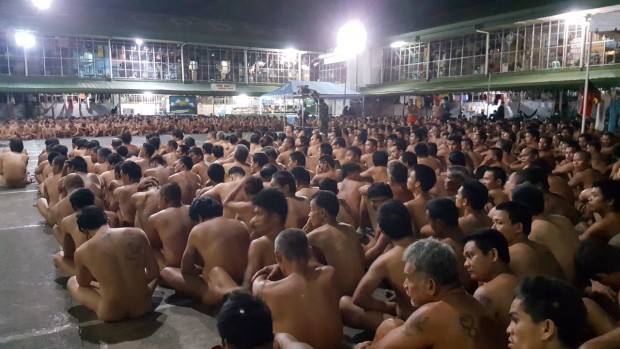
This handout from the Philippine Drug Enforcement AgencyRegional Office 7 (PDEA RO7) taken on February 28, 2017 and released on March 2, 2017 shows naked inmates at the Cebu city jail sitting during a joint raid by the PDEA and the Cebu Police provincial office on illegal drugs and contraband. Handout / PHILIPPINE DRUG ENFORCEMENT AGENCY REGIONAL OFFICE 7 / AFP
CEBU CITY—The Commission on Human Rights (CHR) launched an investigation on Friday after inmates at the Cebu Provincial Detention and Rehabilitation Center (CPDRC) were ordered to strip naked during a surprise raid by Philippine Drug Enforcement Agency (PDEA) operatives earlier this week.
The investigation was led by CHR Visayas (CHR-7) head Leo Villarino after receiving a directive from the commission en banc to find out whether the inmates’ rights were violated at the facility, which in the past gained world renown for its novel rehabilitation program featuring dancing inmates.
“We were here to know if there really was a need to let the inmates remove their clothes,” said Villarino, who was to interview inmates and jail officials on Friday. “What did they want to achieve? We were here to ask questions on what really happened.”
Under the United Nations’ Standards for the Treatment of Prisoners, Villarino said stripping prisoners of their clothes were allowed for security purposes during jail raids.
“But in stripping prisoners naked, intrusive searches are strictly prohibited,” he said.
Intrusive searches, he explained, involved “going into or touching the cavities or crevices of the body.”
CHR investigators also questioned the decision of some media entities to publish the photos of the naked inmates, which caught the attention of Amnesty International, which described the incident as a “cruel, inhuman and degrading treatment of prisoners.”
Amnesty also urged authorities to “ensure that all persons deprived of liberty are protected from torture and other forms of ill-treatment.”
Interior Secretary Ismael Sueno on Friday said he had ordered a separate investigation of the incident.
“Was it really necessary to have them remove all their clothes?” Sueno said in a phone interview.
Yogi Filemon Ruiz, PDEA-7 director, welcomed the CHR probe, stressing that the search was necessary and was done “in a peaceful and orderly manner.”
“I don’t think we violated the rights of the prisoners,” he said. “We didn’t humiliate the inmates. If ever there are those who interpret what we did as degrading the inmates, then I apologize. But there really was no intention to do so.”
Raid
Clad in full battle gear, antinarcotics agents raided the facility before dawn on Tuesday in an operation code named Greyhound. They ordered detainees to take off their clothes and asked them to stay at the facility’s open air quadrangle as they searched their cells.
The agents reported having seized contraband items, including 76 cell phones and 19 medium-size packs of “shabu” (methamphetamine hydrochloride) worth P30,000. Also found were P92,000 in cash, marijuana leaves and assorted drug paraphernalia including lighters, rolled tin foils, scissors, and a digital weighing scale. Bladed weapons, DVD players, a laptop and a passbook with a deposit of more than P300,000 were also confiscated.
Cebu Gov. Hilario Davide III gave the permission to the raiding team, officials said.
Three of the mobile phones were found in the detention cell of suspected Cebu drug lord Alvaro “Barok” Alvaro, where a pack of shabu was also recovered. At least five inmates were also found with packs of shabu and could face additional charges.
The surprise inspection was done barely three weeks after prison officials installed signal jammers to prevent the inmates from calling their contacts outside. The facility was raided by the police six months ago.
One passbook recovered from an inmate associated with Alvaro showed a deposit of P300,000 and withdrawals of P500,000, all in the same day.
The CPDRC has about 3,600 inmates, outnumbering the 289 PDEA agents, policemen and army personnel who took part in the raid. The female detainees were only frisked and separated from the main group.
ACT Teachers Rep. Antonio Tinio described the action of the jail officials as “yet another blatant violation of human rights perpetrated by law enforcers in the course of the Duterte regime’s so-called war on drugs.”
Humiliation
“It can be considered as a form of cruel and degrading punishment, for which those responsible should be held accountable,” the leftist congressman, a member of the supermajority in Congress, said. “The raid could have been conducted and its objectives achieved without resorting to the public humiliation of the prisoners.”
Rodolfo Diamante, executive secretary of the Catholic Bishops’ Conference of the Philippines Episcopal Commission on Prison and Pastoral Care, condemned the incident and said it backed the CHR in its investigation.
“We call on the CHR to hold into account the people who authorized and executed this blatant violation of the dignity of the human person and their human rights,” Diamante said.
But PDEA Director General Isidro Lapeña defended the mass strip search, saying it was necessary to avoid a riot or “mass slaughter” at the prison during the surprise inspection.
He also denied that PDEA released the pictures of the naked inmates, adding that they suspected disgruntled jail guards of leaking the pictures to discredit the early morning raid.
“It was a judgement call. It’s a measure taken by a ground commander to prevent a more serious uncalled for situation,” Lapeña said. “If just one inmate had a hidden blade and he stabbed a lawman, then that will create a situation that everybody does not want to happen. It might (have) resulted in a mass slaughter. The ground commander tried to avoid and prevent that.”
He said the raid was carried out as the facility was fast becoming the “nerve center” of drug operations in Central and Eastern Visayas. —WITH REPORTS FROM PHILIP C. TUBEZA, DJ YAP AND JULIE M. AURELIO